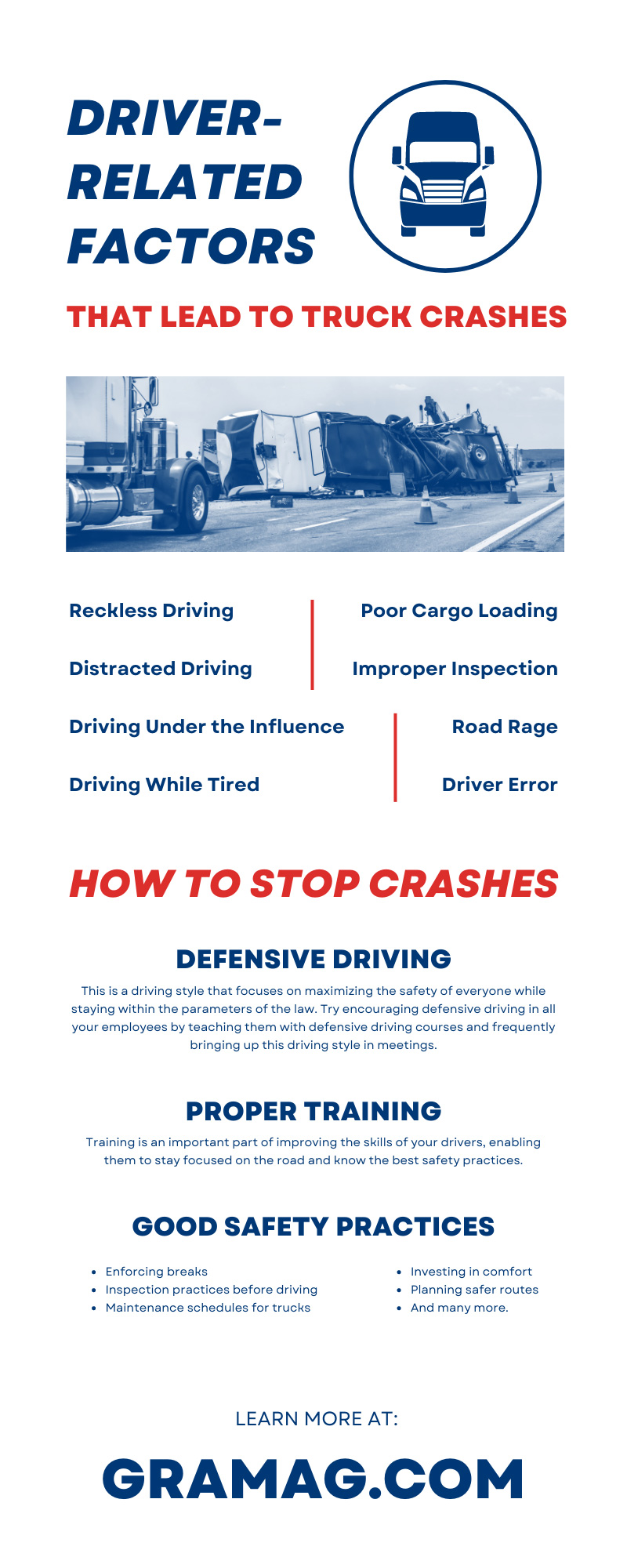Driver-Related Factors That Lead to Truck Crashes
Jun 1st 2023
Truck drivers spend thousands of miles on the road every year to ensure deliveries get to where they need to go. This is an important job for companies and the transportation of goods across the nation. However, that much driving does put a strain on people, increasing the risk of a truck crash. While you can do much to prevent equipment failure and similar issues, it’s important to understand the driver-related factors that can cause these accidents. Once you know them, you can combat them. Here’s a look at the most common reasons truck drivers may get into an accident.
Reckless Driving
Reckless driving is an all-to-common occurrence since people want to get to their destinations as quickly as possible. This can result in speeding and dangerous decisions while traveling on the road. Mistakes like taking corners quickly or switching lanes without checking your blind spots can easily cause an accident. That’s why reckless driving is illegal in every state—it poses a huge threat to people’s safety.
Driving Under the Influence
Another common cause of accidents is driving under the influence. This is a serious crime and extremely dangerous for everyone. Drivers need to be ready to react to any sudden changes on the road, and driving while under the influence slows your reaction time. This can lead to crashes with these huge vehicles and easily cost someone their life.
Distracted Driving
Distracted driving is almost as dangerous as driving under the influence, as you take your eyes off the road and can miss sudden changes or obstacles. Distracted driving can mean anything from looking at your phone to grabbing something off the floor—anything that causes you to look away from the road. Even discomfort from the seats can be distracting. It’s far safer to stop and deal with whatever issue comes up than trying to resolve it while in motion. Investing in tools that increase comfort, like aftermarket commercial truck seats, can also help.
Driver Error
Sometimes, there’s no cause for an accident outside of driver error. It’s easy to miss a car or think you can make a turn when you can’t make it. To avoid potential errors, drivers need to pay attention to the road and learn to play it safe rather than take any risks when on the road. Driving a semi isn’t easy, and it takes good decision-making to ensure everyone’s safe on the road.
Driving While Tired
While it’s not legally as bad as driving under the influence, driving while tired can have a similar effect. From lowering your reaction speed to worsening your decision-making skills, driving while tired is bad and something all drivers should avoid. It’s sad, but many people have lost their lives because someone fell asleep behind the wheel.
Poor Cargo Loading
When loading a semi, drivers should be a part of the process. While they may not need to load up the items, knowing how it’s all put together can help avoid accidents on the road. Products shouldn’t fall off the truck, but drivers should be alert just in case something does happen. A driver should never leave the loading area if they suspect something’s wrong with the cargo loading or securement.
Improper Inspection
Before every drive, semi drivers should check the vehicle’s mechanical parts. From the oil levels to the tire pressure, everything needs to be ready to handle the full length of the trip. While equipment failure isn’t the driver’s fault, ensuring that their vehicle is in the best shape is something they need to do before every drive.
Road Rage
Driving hour after hour can be mentally and physically exhausting, especially if you need to deal with other drivers. However, a driver should never lose their patience and start acting in anger, as this can lead to all sorts of issues. Road rage is a serious problem and can lead to accidents and even death, which is why controlling emotions is a big part of driving a semi. When you have such a large and heavy vehicle, driving in anger only results in mistakes and issues.
How To Stop Crashes
The next question you should have about driver-related issues that cause accidents is, “What you can do to prevent these incidents?” While there’s only so much you can do, the company can change to enable good semi drivers and help foster better drivers. There are many changes companies can make; here’s a look at a few good options you can start using immediately.
Defensive Driving
Defensive driving is your best bet to combat driver error and reckless driving. This is a driving style that focuses on maximizing the safety of everyone while staying within the parameters of the law. Try encouraging defensive driving in all your employees by teaching them with defensive driving courses and frequently bringing up this driving style in meetings.
Proper Training
Training is an important part of improving the skills of your drivers, enabling them to stay focused on the road and know the best safety practices. Start training programs and bring in experts to teach drivers the best practices when driving to help curb the number of driving accidents and incidents.
Good Safety Practices
Every company uses a different set of internal safety regulations that limit what their employees should do and outline the best practices. Take a look at your practices and try improving them to encourage safety on and off the road. Your workers are far more likely to avoid issues if your workplace focuses on keeping them safe through regulations and policies. These policies should include things like:
- Enforcing breaks
- Inspection practices before driving
- Maintenance schedules for trucks
- Investing in comfort
- Planning safer routes
- And many more.
Semi-truck driver safety should be a huge concern for every company that uses these vehicles, but this should help you understand some of the driver risks. While there’s only so much you can do to stop these accidents, you can try to minimize the risks by teaching your drivers and encouraging a safety-first mentality.


